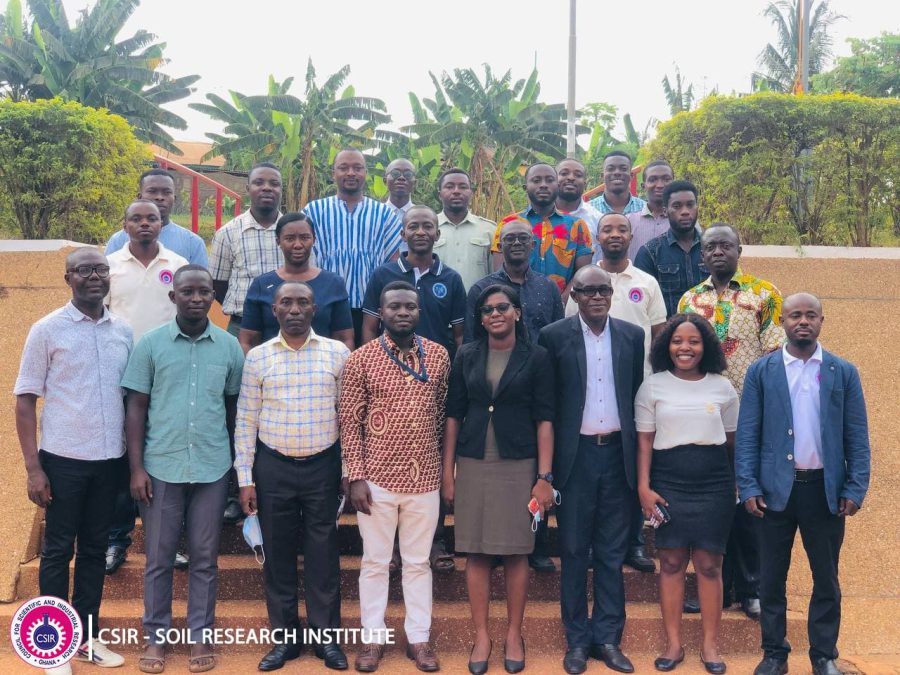CSIR-SOIL SCIENCE SOCIETY OF GHANA (SSSG) CELEBRATES WORLD SOIL DAY IN KUMASI


The World Soil Day (WSD) celebration was held on 16th December 2021 under the theme “Halt Soil Salinization, Boost Soil Production” at Soil Research Institute at Kwadaso, Kumasi.
Participants, both virtual and physical, shared success cases in sustainable Soil Management and Land degradation neutrality in the country.
Dr Francis M. Tetteh, the outgoing president of SSSG and a research scientist at Soil Research Institute, Kumasi said, the purpose of SSSG celebrating this day is to raise awareness of soil and dissemination and knowledge on the soil, emphasizing the importance of sustainable Soil Management to avoid impairing key Soil functions.
“Cassava and other forest crops are not salt-tolerant; hence salinization affects the productivity of the soil and the growth of these crops.”
Dr Edward Yeboah, (AG Director, CSIR-SRI), in his keynote address, said “Noting that a World Soil Day (WSD) can contribute to raising awareness of desertification, land degradation and drought, in line with the aim of the United Nations Convention to Combat Desertification in those Countries Experiencing Serious Drought and/or Desertification, particularly in Africa, an international day to celebrate Soil was recommended by the International Union of Soil Sciences (IUSS) in 2002”.
According to Dr Yeboah, Soil Salinization and Sodification are major soil degradation processes threatening ecosystem services and are recognized as being among the most important and oldest problems at a global level for agricultural production, food security and sustainability in arid and semi-arid regions because of insufficient annual rainfall to flush accumulated salts from the crop root zone.
He further explained that World Soil Day 2021 and its campaign “Halt soil salinization, boost soil productivity” aims to raise awareness of the importance of maintaining healthy ecosystems and human well-being by addressing the growing challenges in soil management, fighting soil salinization, increasing soil awareness and encouraging societies to improve soil health.
“As already stated, salt-affected soils are a serious challenge to millions of people and their livelihoods around the globe. Salt-affected soils include saline, sodic and saline-sodic soils. In Ghana, salt-affected soils are mostly observed in the coastal areas like Ada, Anloga, Afife and in some irrigated sites,” in the country.
Both saline and sodic conditions considerably reduce agricultural productivity. According to the FAO, over 833 million hectares of soils are affected globally. This, according to Dr Yeboah, represents nearly 9% of the World’s land surface area, a space over four times the size of India.
Dr Yeboah urged SSSG members to become nationally conspicuous and champion the agenda in addressing soil-related problems in the country since healthy soils make up the foundation for agricultural development, ecosystem functions and food security.
The following are the newly elected executives of SSSG; President, Dr Edward Yeboah, Ag. Director, Soil Research Institute, Kumasi, Vice -President, Prof.Kwame Agyei-Frimpong, UCC; Dr Kofi Atiah, the Treasurer; Dr Christine Adler Phares as the secretary and Dr William Atakora, Publicity Secretary.
Dr Mrs Ophelia Osei Ulzen and Dr Alfred Arthur were also elected the Ashanti and Eastern regional representatives of SSSG, respectively.